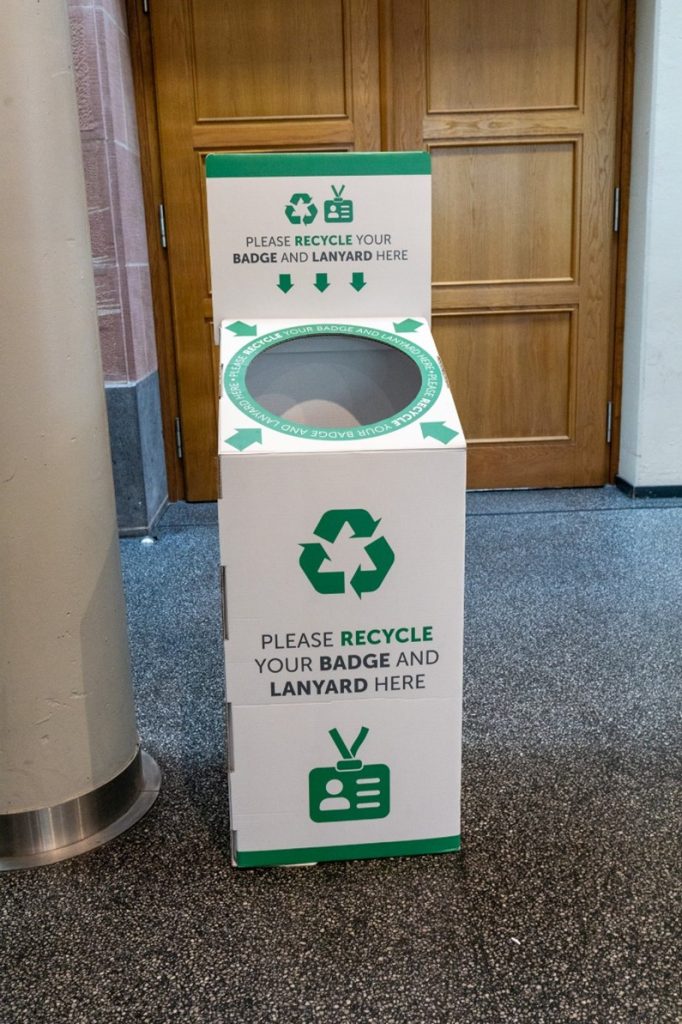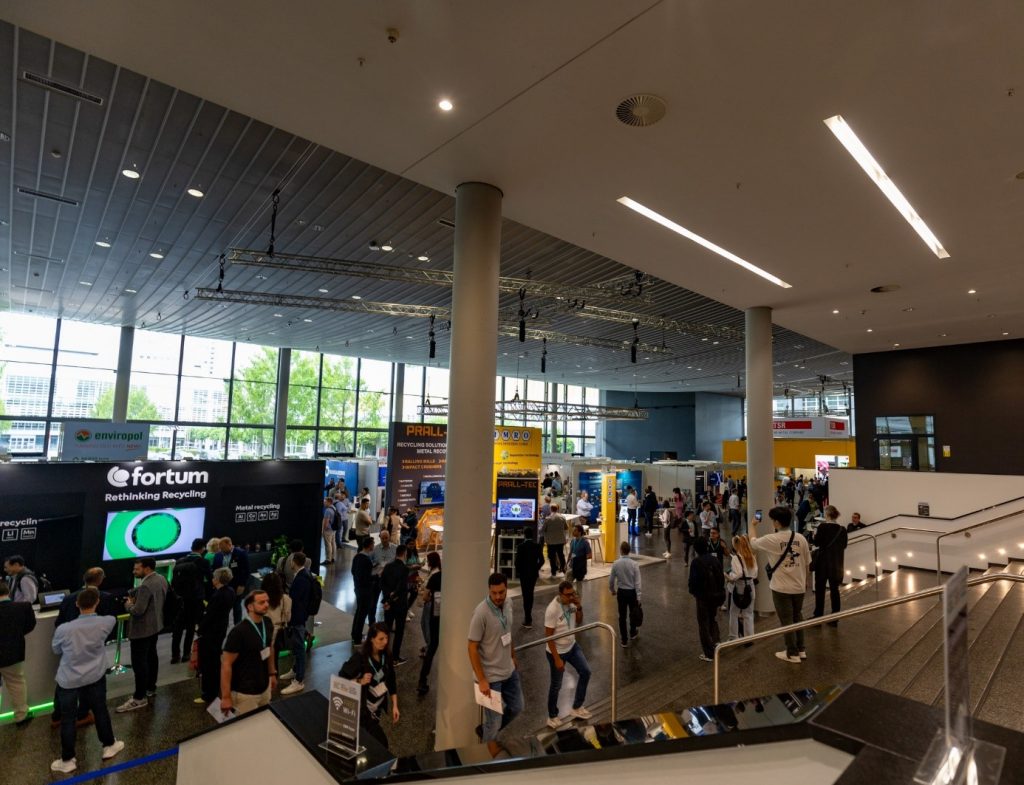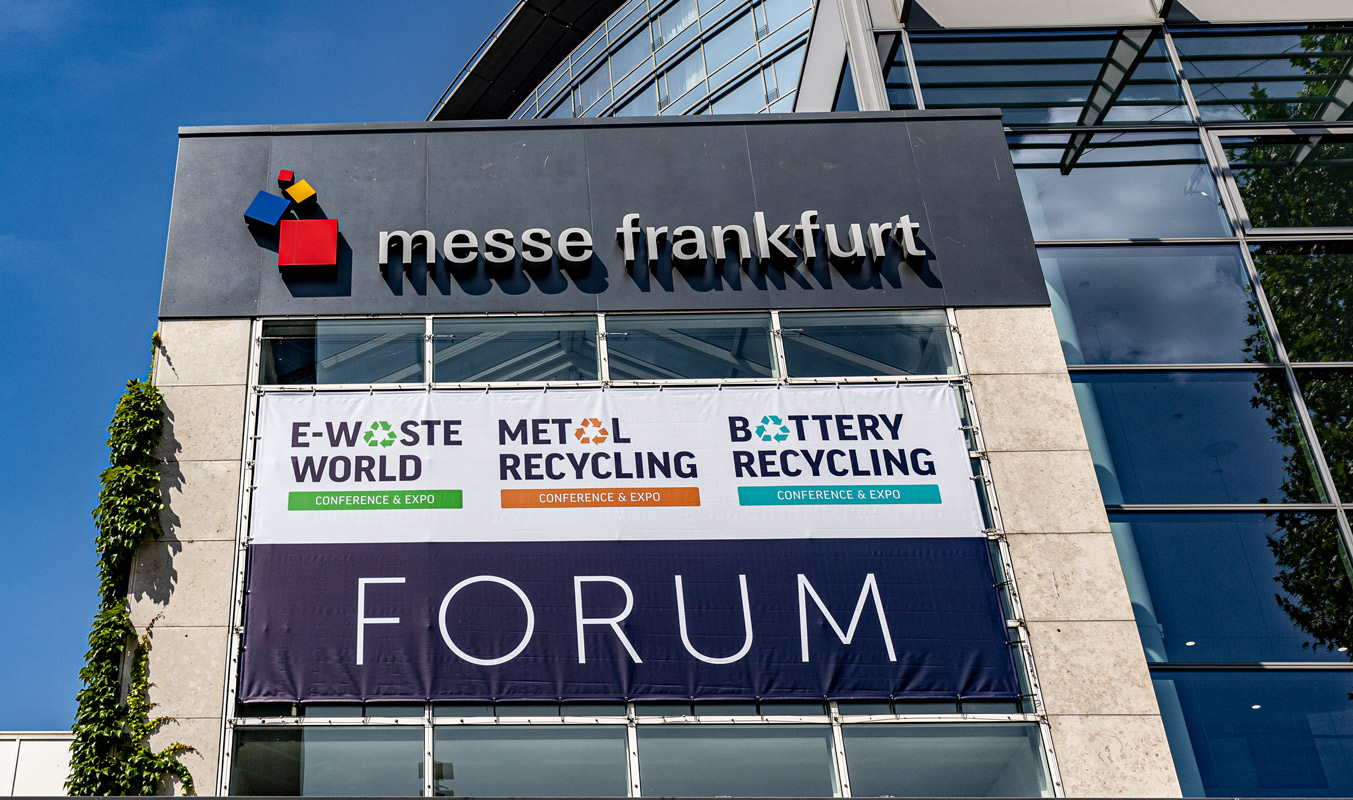German financial capital stood at the center of the recycling industry for two days
From June 28 to 29, the E-Waste World Conference & Expo took place at the Forum of Messe Frankfurt. As befits an event dedicated to all facets of resource conservation, the exhibition organizer Trans-Global Events removed the usual plastic covers from the name badges. At the exit, the collars and tickets that were no longer needed could then be recycled. Living up to the event’s name.

Recycling fully conceptualized
The audience was already spoiled for choice on the first day among a good 50 lectures, which took place in four parallel tracks. The selection of the Rawmaterials.net editorial team fell on the fourth one: “Metal & Critical Material Recycling”. Dr. Britta Bookhagen, head of the “Secondary Raw Materials” work area at the German Mineral Resources Agency (DERA), a division of the Federal Institute for Geosciences and Natural Resources (BGR) founded in 2010, kicked things off. Bookhagen provided a comprehensive overview of the state of metal recycling in Germany but also introduced the audience to the work of her agency.
In response to our question as to whether DERA, as a center of expertise for raw materials, was not severely understaffed with only 25 employees considering the increasingly vocal discussions about German dependence on imports, Bookhagen pointed out that it was only with the Corona pandemic and the war in Ukraine that the vulnerability of supply chains came into focus. Prior to that, she said, the need for additional information services and personnel was non-existent due to the smoothly functioning market for critical minerals. Yet, the concentration of mine production in just a few countries is not a new finding. Only 15 countries account for 80 percent of production, and China accounts for as much as 50 percent of downstream processing, Bookhagen said. Germany meets its demand for metal ores and concentrates exclusively through imports. It is therefore urgent to place the supply on several pillars: Domestic production and, of course, recycling. The recycling rate for critical raw materials such as rare earths, gallium, germanium, and graphite is less than one percent. Data is not even available for lithium, manganese, or cobalt. In addition, the main areas of application for many of these resources, e-mobility, solar, and wind energy, see no recycling yet; this could become a significant factor in the future.
From Consuming to Using
In her presentation, Bookhagen also pointed out that a change in awareness is necessary among the population: away from consumers who simply exhaust raw materials to users who are consciously aware of the resources they carry around with them, for example in the form of cell phones. At just over one euro, the material value is not very high, but it’s the mass that makes the difference: According to an estimate by the German digital economy association Bitkom, around 200 million cell phones lie unused in drawers in Germany. In the panel discussion that followed, it became clear that Europe’s largest economy must do more to alleviate its oppressive dependence on China and other countries. Director of Government Affairs at the raw materials company Umicore, Dr. Sven Jantzen, expressed respect for China’s raw materials strategy and dominance – the country recognized the importance of critical resources and, above all, its influence over them decades ago and acted accordingly. At the same time, Jantzen warned against resignation, because there are options. The Inflation Reduction Act, he said, is an example of a practical approach to a solution. The U.S. law was also a recurring topic in other presentations and discussions. Jantzen also pointed out that raw materials, for example from discarded electrical appliances, must find their way into the recycling loop, and that this requires a change in people’s behavior. “Time to get started”, an appeal to get going, one can only agree.

Between the lectures, panel discussions invited for exchange
The other presentations and discussion panels showed above all how complex the supply chains for critical minerals are. Rhona O’Connell from the financial services provider StoneX, for example, pointed out the current uncertainties in the market for platinum group metals. In view of the problems with the power supply in South Africa, one of the most important producing countries, trouble could be looming here. Initially, this is likely to affect particularly the energy-intensive smelting operations.
Just how well attended the event was and how great the desire for networking in the industry was, became apparent at the latest during the lunch break. Business cards were passed from one hand to the other with great frequency, and it will be interesting to see what results this produces.
The second day of the trade fair also brought fresh impetus and interesting insights, for example specifically on the recycling of neodymium and other representatives of the rare earths, but also the platinum group metals. Another topic was sustainably produced “green” steel, such as that already used by truck manufacturer Volvo for its electric trucks. The assessments of the supply situation for battery metals in the EU were also exciting. According to calculations by the information service Project Blue, demand for cathode material (cobalt, nickel, lithium, and the like) in the EU will increase by 736 percent between 2022 and 2033. This cannot be met by domestic production alone.

One quickly got into conversation here
Frankfurt Remains Venue for the Exhibition in 2024
Practical solutions were on display on the exhibition floor, which was already well attended shortly before the official start of the exhibition. It is quite clear: The interest in the topic is great and international. According to event director Peter Sarno, 1,400 unique visitors were already on site on the first day, and a total of nearly 2,000 got a picture of the latest market developments. In 2024, the exhibition will again be held in Frankfurt am Main, a location that is internationally known and impresses with its proximity to financial institutions, according to Sarno. The date is June 26-27, 2024.

More recycling so that the Hammering Man in front of Messe Frankfurt never runs out of work
Photos: Eric Hendrich/ Rohstoff.net


